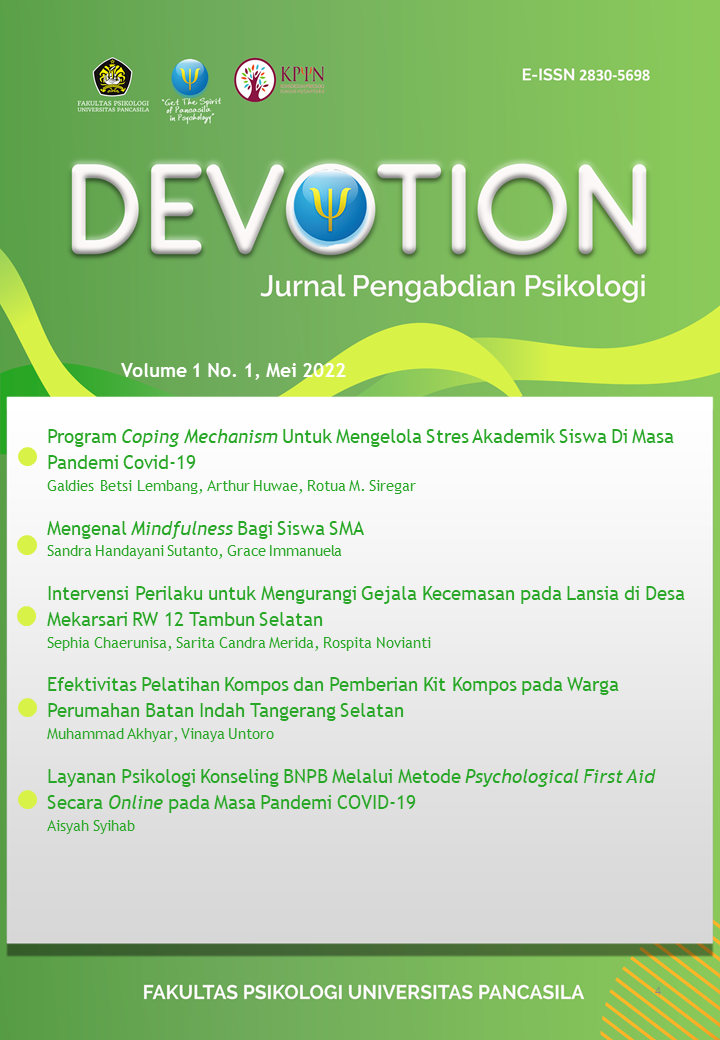Efektivitas Pelatihan Kompos dan Pemberian Kit Komposter pada Warga Perumahan Batan Indah Tangerang Selatan
Abstract
This study aims to determine the effectiveness of training in home composting for residents in Batan Indah Tangerang housing estate. A total of 20 residents of the Batan Indah participated in the home composting training by BRIN (National Research and Innovation Agency). Only 12 residents participated to fill the training effectiveness questionnaire. The results show that although there are still obstacles to composting, home composting effectively increases other pro-environmental behaviors (spill-over behavior). After the training, there is an increase in the intensity of sorting waste behavior and a reduction in wastefulness. Home composting is still seen as an effective strategy to create a sustainable environment at the household level.
References
Ajzen, I. (2012). The theory of planned behavior. In Handbook of theories of social psychology, Vol. 1 (pp. 438-459). Sage Publications Ltd. https://doi.org/10.4135/9781446249215.n22
Azim, K., Soudi, B., Boukhari, S., Perissol, C., Roussos, S., & Alami, I.T. (2018). Composting Parameters and Compost Quality: A Literature Review. Organic Agriculture, 8, 141–158. https://doi.org/10.1007/s13165-017-0180-z
Elmi, A., Al-Harbi, M., Yassin, M.F., & Al-Awadhi, M.M. (2021). Correction to: Modeling gaseous emissions and dispersion of two major greenhouse gases from landfill sites in an arid hot environment. Environmental Science and Pollution Research, 28, 15424–15434. https://doi.org/10.1007/s11356-020-12055-6.
Gkargkavouzi, A., Halkos, G., & Matsiori, S. (2019). How do motives and knowledge relate to intention to perform environmental behavior? Assessing the mediating role of constraints [Article]. Ecological Economics, 165, Article 106394. https://doi.org/10.1016/j.ecolecon.2019.106394
Kopaei, H. R., Nooripoor, M., Karami, A., Petrescu-Mag, R. M. & Petrescu, D.C. (2021). Drivers of Residents’ Home Composting Intention: Integrating the Theory of Planned Behavior, the Norm Activation Model, and the Moderating Role of Composting Knowledge. Sustainability, 13, 6826. https://doi.org/10.3390/su13126826.
Loan, L.T. T., Takahashi, Y., Nomura, H., & Yabe, M. (2019). Modeling home composting behavior toward sustainable municipal organic waste management at the source in developing countries. Resources, Conservation & Recycling, 140, 65–71. https://doi.org/10.1016/j.resconrec.2018.08.016
López, R., Burgos, P., Madrid, F., & Camuña, I. (2015). Source Separate Collection of Recyclables Reduces Chromium and Nickel Content in Municipal Solid Waste Compost. CLEAN–Soil Air Water, 43, 427–433. https://doi.org/10.1002/clen.201300821
Kementerian Lingkungan Hidup. (2021). Capaian Kinerja Pengelolaan Sampah. https://sipsn.menlhk.go.id/sipsn/
Markiewicz, A. and Patrick, I. (2019). Developing Monitoring and Evaluation Frameworks. In J. Bhawra (Ed.), Canadian Journal of Program Evaluation. 34. 10.3138/cjpe.53169.
Pérez-Urrestarazu, L., Kaltsidi, M. P., Nektarios, P. A., Markakis, G., Loges, V., Perini, K., & Fernández-Cañero, R. (2021). Particularities of having plants at home during the confinement due to the COVID-19 pandemic. Urban Forestry & Urban Greening, 59, 126919. https://doi.org/https://doi.org/10.1016/j.ufug.2020.126919
Sampah Kota atau Municipal Solid Waste (MSW) dan Penyelesaian Masalahnya. (2016, November). Newsletter 24 PT Mitrakreasi Amrita. Retrieved from http://www.amritaenvironmental.com/tinymce/tees/Newsletter-24.XI_.2016.pdf
Sun, L., Yang, S., Li, S., & Zhang, Y. (2020). Does education level affect individuals' environmentally conscious behavior? Evidence from Mainland China [Article]. Social Behavior and Personality, 48(9), Article e8488. https://doi.org/10.2224/SBP.8488
Tchetchik, A., Kaplan, S., & Blass, V. (2021). Recycling and consumption reduction following the COVID-19 lockdown: The effect of threat and coping appraisal, past behavior and information [Article]. Resources, Conservation and Recycling, 167, Article 105370. https://doi.org/10.1016/j.resconrec.2020.105370
Tiong, Y. Y., Sondoh, S. L., Jr., Tanakinjal, G. H., & Iggau, O. A. (2021). Cleaner operations in hotels: Recommendation for post-pandemic green recovery [Article]. Journal of Cleaner Production, 283, Article 124621. https://doi.org/10.1016/j.jclepro.2020.124621
Vinti, G., Bauza, V., Clasen, T., Medlicott, K., Tudor, T., Zurbrügg, C., & Vaccari, M. (2021). Municipal Solid Waste Management and Adverse Health Outcomes: A Systematic Review. International journal of environmental research and public health, 18 (8), 4331. https://doi.org/10.3390/ijerph18084331
Yang, N., Zhang, H., Shao, L.-M, Lü, F., & He, P.-J. (2013). Greenhouse Gas Emissions during MSW Landfilling in China: Influence of Waste Characteristics and LFG Treatment Measures. Journal of Environmental Management, 129, 510–521. https://doi.org/10.1016/j.jenvman.2013.08.039









